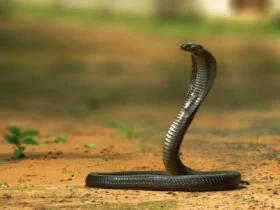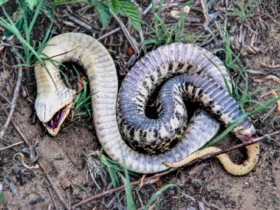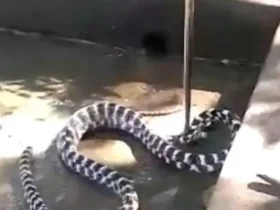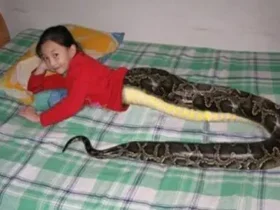A man from Yunnan has shared his living space with 25 snakes for a remarkable 17 years. Snakes, being cold-blooded creatures, may raise the question of why they haven’t bitten him. Bai Tuo, as he is known, has developed a unique affinity for snakes since he was only 15 years old in 2004. Interestingly, he not only lacks fear but also harbors a deep fondness for these reptiles. Due to his extensive experience in snake breeding, he was employed as a caretaker at a safari park. Whenever the forest authorities confiscated wild animals like snakes, they would be sent to the zoo. However, due to inadequate reptile facilities, Bai Tuo would take them home to care for them. When conditions allowed, he would transfer these snakes to the zoo for breeding. Over the course of 17 years, he has successfully coexisted with snakes, gradually gaining the acceptance of his family and friends.
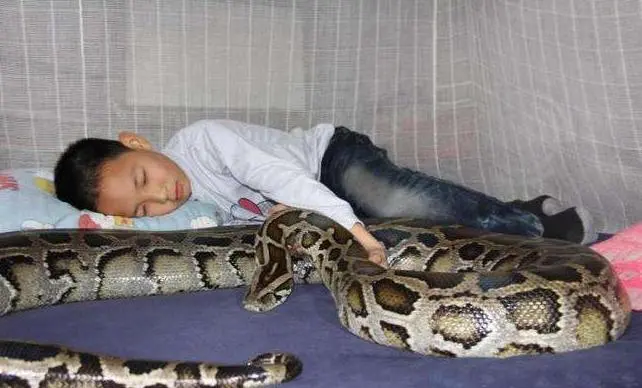
Upon returning home each day, Bai Tuo diligently checks the well-being of each snake, attends to any sick individuals, and engages with the more docile pythons. Sometimes, he even falls asleep on the couch with pythons resting on his pillows.
Cold-blooded animals, contrary to popular belief, encompass a broad range of creatures apart from mammals and birds. This classification signifies their inability to regulate body temperature internally, relying instead on external factors to either release or absorb heat to maintain body temperature.
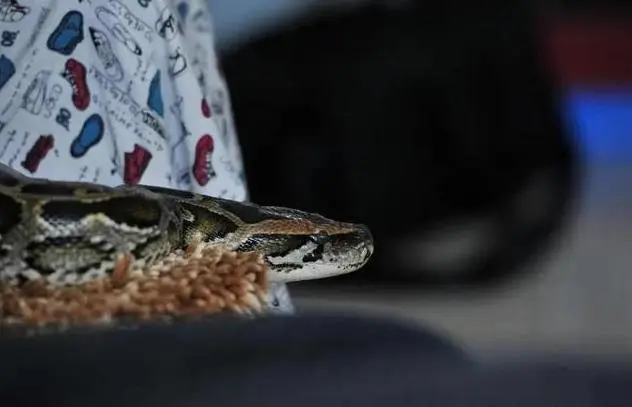
Metabolism in cold-blooded organisms restricts the development of high-energy-consuming brains, resulting in relatively smaller brain volumes compared to mammals. Consequently, their intelligence is generally lower, and they possess limited knowledge and memory capacity. These traits, however, are unrelated to the perceived ruthlessness associated with being cold-blooded. To optimize brain capacity, their senses are highly specialized for hunting.
Similarly, snakes possess relatively simple brain structures and less complex nervous systems than humans and other reptiles. Their intelligence is not particularly high, and they do not engage in psychological activities or form emotional connections with humans. When raising pet snakes, snakes initially display nervousness and anxiety toward their new environment and exhibit a defensive state when people approach too closely. However, they gradually adapt to the new surroundings and scent, reducing tension and anxiety.
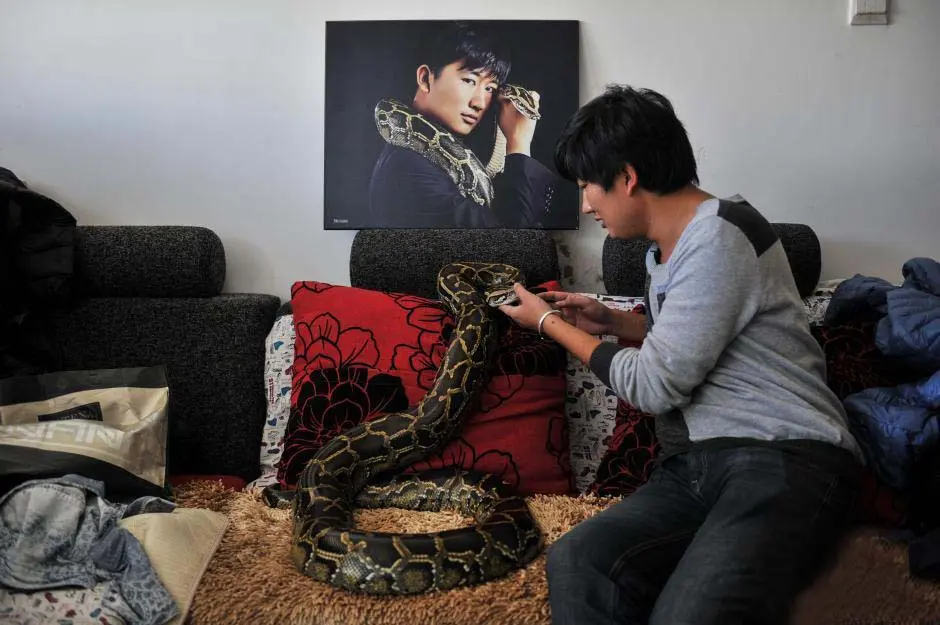
Many individuals claim that snakes become attached to their owners and will not attack them. In reality, snakes adapt to their environment and develop familiarity with a person’s scent through long-term interactions, understanding that there is no threat or predatory intent. Although snakes may not form emotional connections like cats and dogs, they can develop conditioned reflexes. These reflexes arise from temporary neural connections between external stimuli and the organism’s response under specific conditions.
In the wild, snakes primarily fear humans due to the potential harm they may cause. Snake bites are defensive acts, aimed at self-preservation. If a snake is consistently handled without harm, its defensive response will weaken, eventually diminishing its fear. Consequently, it will not actively attack the person, whether it is its owner or someone else. Bai Tuo’s ability to coexist with snakes for such a prolonged period stems from this phenomenon. Hence, many people believe that humans can peacefully live alongside snakes.
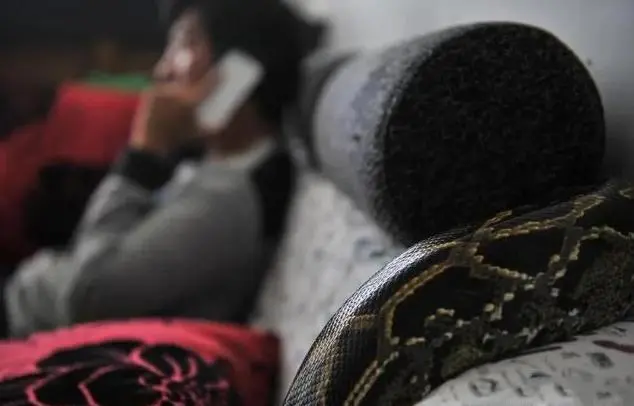
Living harmoniously with a snake is indeed possible, but it is unrealistic to expect an emotional bond to form between the snake and its owner. If a snake detects the scent of its typical prey, such as rats or other animals, it may bite without hesitation, regardless of its relationship with the owner.
Bai Tuo has also experienced snake bites in the past. On one occasion, he cared for a Burmese python that had been burned by a heat lamp. Despite his attentive wound care, the python became anxious and nervous due to environmental and scent-related factors. Subsequently, it bit Bai Tuo directly on the forehead.
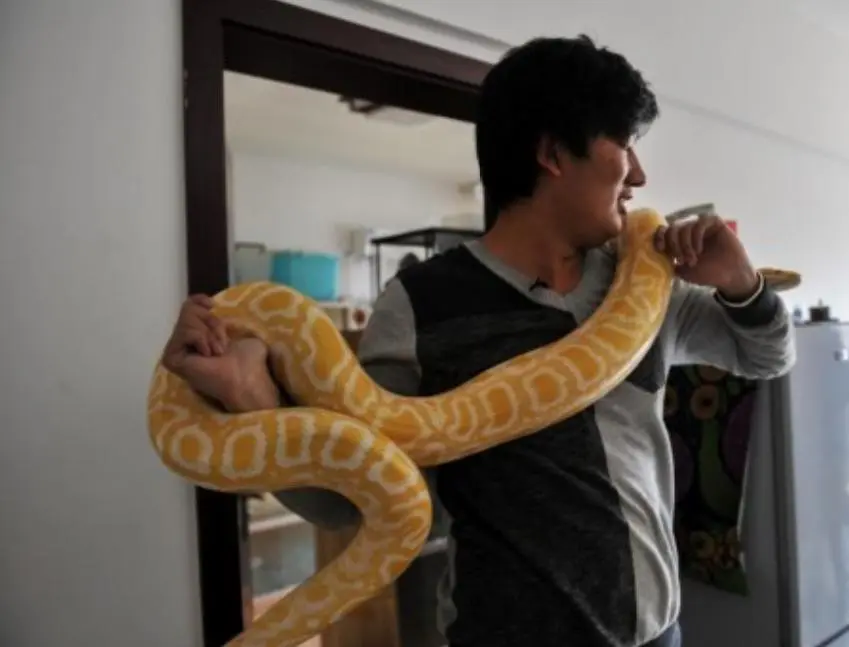
Instances of snake bites during the process of keeping them as pets are not uncommon. For example, a 21-year-old girl who purchased silver ring snakes online tragically died after being bitten by her pet. Similarly, a 3-year-old boy who secretly kept snakes was bitten twice within two months.
The reason Bai Tuo has remained unharmed is that most of the snakes he raises are non-venomous pythons. Pythons do not possess venom and rely on constriction as their primary method of attack. They conserve energy by sensing the gradual weakening of the prey’s heartbeat and subsequently reducing the force of their constriction. Only when the prey’s heart stops beating does the python cease its attack, preventing the prey from escaping.
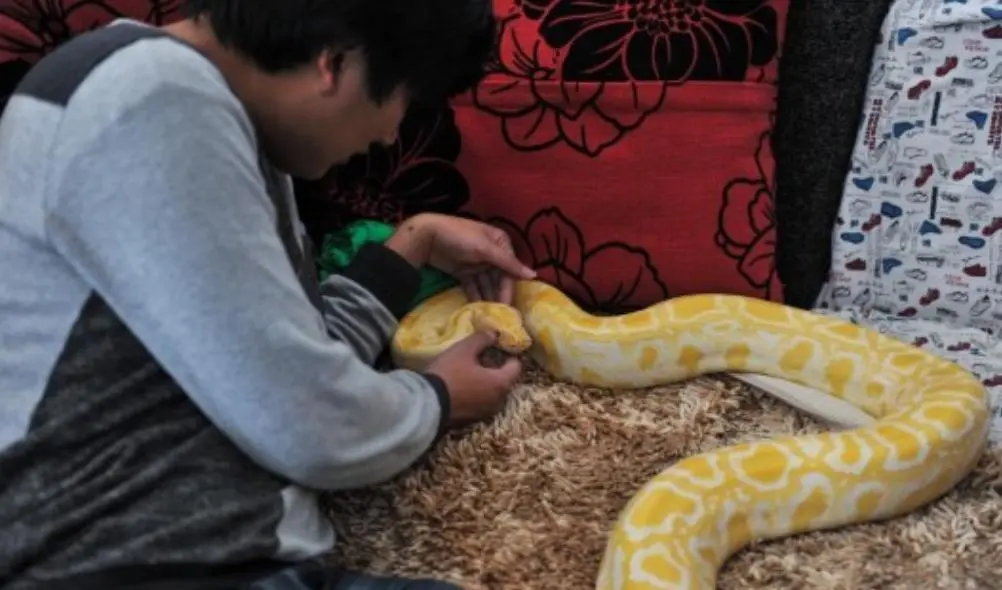
The ability of pythons to kill prey through constriction grants them a unique evolutionary advantage, allowing them to overpower animals much larger than themselves. While pythons typically feed on rodents and birds, they are also capable of hunting larger animals, including monkeys and wild boars.
When considering snake ownership, it is crucial to select non-venomous species. Additionally, it is important to determine if the snake is a protected species and to ensure legal acquisition through legitimate channels. Smuggling snakes through customs should be strictly avoided, with domestic purchases from reputable sources being preferable. Examples of non-venomous snakes suitable for keeping as pets include milk snakes, king snakes, corn snakes, and pig-nosed snakes.

